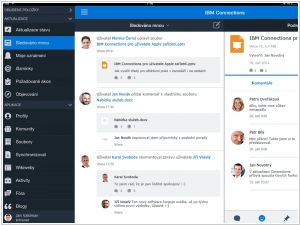HCL Connections vs Jive
May 18, 2023 | Author: Adam Levine
13
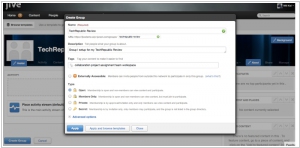
Jive’s enterprise social networking platform allows you to engage employees, customers, and the social web. Increase the efficiency of internal communication, build brand loyalty, and monitor customer chatter and ideas, all from one central location. Say good bye to your intranet, multiple logins for scattered enterprise apps, and being out of the loop; the Jive Engage platform integrates the social networking tools you love and need so you can focus on what matters.
HCL Connections and Jive are both enterprise collaboration platforms that facilitate communication, knowledge sharing, and collaboration within organizations, but they have distinct differences in terms of features and deployment options. HCL Connections is a comprehensive digital workplace platform that offers features such as social networking, file sharing, document collaboration, community forums, and project management tools. It focuses on connecting employees, promoting collaboration, and fostering a sense of community within the organization. HCL Connections can be deployed on-premises or in the cloud, providing flexibility in implementation. Jive, on the other hand, is a cloud-based collaboration platform that emphasizes social intranet capabilities, discussion forums, and employee engagement. It offers features such as blogs, wikis, document sharing, and integration with other business tools. Jive focuses on creating a digital hub for employees to connect, communicate, and collaborate.
See also: Top 10 Enterprise Social Software
See also: Top 10 Enterprise Social Software
HCL Connections vs Jive in our news:
2017. Collaboration software company Jive acquired by Aurea

Community collaboration software company, Jive, has been acquired by ESW Capital's Wave Systems for a significant amount of $462 million. Following the acquisition, Jive will join the Aurea family of companies and be integrated into Aurea's customer experience management platform. This strategic move equips Aurea with a powerful tool for establishing both internal and customer-facing communities, which plays a crucial role in the contemporary customer service landscape. Furthermore, the acquisition grants Aurea access to Jive's impressive customer base, which includes prominent names like T Mobile, Schneider Electric, McAfee, and EMC. This acquisition strengthens Aurea's position by expanding its capabilities and widening its reach within the market.
2015. 3 new Jive workstyle apps aim to simplify workplace collaboration
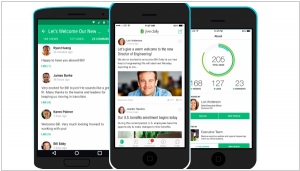
The social collaboration software Jive has introduced three new workstyle apps: Jive Daily, Jive Chime, and Jive People. Each app serves a specific purpose to enhance communication and productivity within the workplace. Jive Daily is designed to facilitate efficient communication by spreading information, driving conversations, and providing real-time analysis of communication impact. As an app, it enables employees to easily stay informed about updates, messages from company executives, and relevant company news. Jive Chime serves as a mobile communication tool, allowing users to engage in text-based or instant messaging experiences without revealing personal cell phone numbers or personal IM identities. It ensures seamless communication while maintaining privacy. Jive People introduces a company directory 2.0 with a workplace graph. It simplifies the process of finding and connecting with colleagues. When users identify the person they wish to communicate with, they can effortlessly reach out via email, phone call, or Jive Chime by simply pressing a button. Overall, these workstyle apps from Jive aim to enhance collaboration, streamline communication, and foster efficient interactions among employees within the workplace.
2014. Jive integrates with Office 365
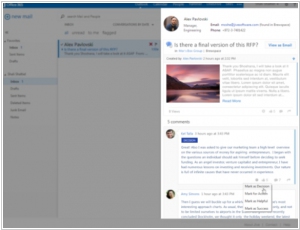
Jive, an enterprise social collaboration provider, has developed specialized software connectors designed specifically for Microsoft Office 365. This integration encompasses various components of Office 365, including Outlook Online, Office Online, SharePoint Online, and OneDrive for Business. For Jive users, this seamless integration greatly simplifies the process of creating and collaborating on documents, spreadsheets, presentations, and even email. It doesn't matter whether they are utilizing Office on-premise, in the cloud, or in a hybrid environment. As enterprises often adopt Office 365 at different rates, Jive plays a vital role in connecting and bridging these diverse systems. Acting as a central communication hub, Jive breaks down organizational silos and equips employees with the necessary tools to work effectively across different technologies and devices. Noteworthy integrations include Box, Salesforce, Cisco, and other platforms.
2014. Cisco-Jive and 5 other Unified Collaboration leaders
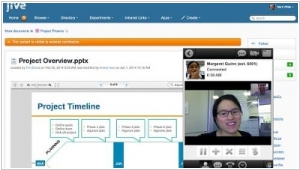
Large enterprise customers have grown increasingly impatient, seeking a single solution that offers collaboration, social interactions, and real-time communication without the need for extensive integration projects. To meet this demand, software vendors have coined the term "Unified Collaboration" and now market their solutions under this banner. However, not every IT giant is capable of building such a comprehensive system on their own. In some cases, collaboration becomes necessary. For instance, leading unified communications provider Cisco recently partnered with social networking provider Jive, announcing that they now offer the best solution in the market. Nevertheless, industry experts highlight that Cisco faces strong competition from five key rivals: Microsoft (Yammer + Lync), IBM (IBM Connections + IBM Sametime), Citrix (GoToMeeting + Podio), Siemens (Unify + Ansible), and Salesforce (Chatter + DimDim). However, it should be noted that the latter two vendors are currently considered potential competitors, as their Unified Communications (UC) solutions are not yet fully developed.
2013. IBM kills Lotus. Microsoft kills SharePoint
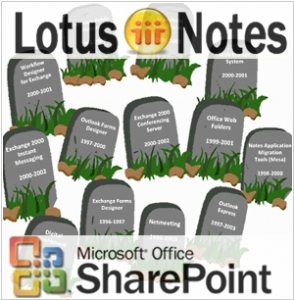
Perhaps the two most famous brands in the history of enterprise software, Lotus and SharePoint, will soon disappear. We mean brands, not specific products. Because by renaming their products, vendors try to erase the association with outdated technologies in customer brain. For example, Lotus appeared back in the 80-s years of last century. In 1995 IBM acquired Lotus Development and began selling their products Lotus Notes/Domino. In the following years most IBM collaboration systems moved under the Lotus umbrella. But last year the revolution occurred. The last child of the Lotus family - SaaS suite LotusLive was renamed to SmartCloud for Social Business. And then the name Lotus was removed from other products. The final nail was the recent launch of Notes/Domino 9.0 Social Edition (without Lotus). ***
2013. IBM embed Email into Connections to drive users out of Email
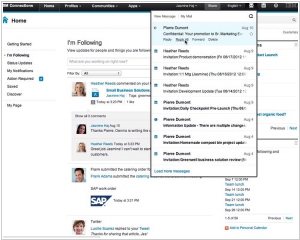
For quite some time, collaboration vendors have been attempting to steer users away from relying on email. They aim to convince us that sharing files and information through alternative means is more convenient than traditional email communication. However, users are reluctant to abandon a technology that has proven its effectiveness over many years, with the inbox remaining the primary workspace for most information workers. Nevertheless, IBM has devised a novel approach to encourage people to transition from email to social tools by integrating email functionality into their social intranet, IBM Connections. Now, users can access emails, contacts, and calendars (stored in either Lotus Domino or Microsoft Exchange mail servers) directly within the Connections interface. This integration offers users the flexibility to choose between sharing content or sending an email, all without needing to switch between applications. Furthermore, if a user opts to "send an email," they can select files from the IBM Connections Files storage. In such cases, the system doesn't attach files to the email; instead, it inserts links to the message and automatically shares the files with the recipients. Clearly, IBM's intention is to position Connections as the central hub within its collaboration suite, much like Microsoft's SharePoint in their suite. In fact, IBM's suite is aptly named IBM SmartCloud for Social Business, emphasizing the importance of the "social" aspect in their comprehensive offering.
2012. Jive acquires Producteev and Meetings.io
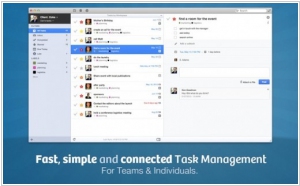
If you aspire to dominate the collaboration market, you must equip customers with a comprehensive suite of tools, including social intranet, file sharing (akin to Dropbox), task/project management, email, and video/web conferencing. While Jive has been considered a leading social intranet provider and has addressed file sharing through its partnership with Box, it is now time for them to advance and catch up with industry leaders like Microsoft and Salesforce, who are unafraid to acquire startups to bridge gaps in their collaboration suites. In a recent announcement, Jive revealed the acquisition of two impressive startups: the task management app, Producteev, renowned for its user-friendly interface and multi-platform support, and the online meetings tool, Meetings.io, which functions as a simple notepad for online meetings. To celebrate the addition of these new team members, the Jive team has created an endearing video, exemplifying the usefulness of video content for businesses.
2012. IBM LotusLive becomes SmartCloud for Social Business
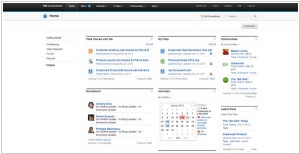
IBM's SaaS collaboration services under the LotusLive umbrella received a lot of good reviews and always presented in the analyst top product lists. Nevertheless they haven't been very successful in sales (compared to the competitors). "What's the problem?" - IBMers tried to figure out - "Maybe the problem in the name? Or in marketing?". And they decided to copy the model of Salesforce and to see what will happen. They decided to remove the word "Lotus", which many people associate with the heavy software from the past. And instead, wherever it's possible, they put the words "Cloud" and especially "Social". In result, LotusLive becomes SmartCloud for Social Business. In its description you'll find such words as Social, Social and Social. And on the US television the new SmartCloud cartoon commercial (reminding Salesforce Chatter ads) has appeared (watch the video). ***
2011. Hot trends by Yammer, Jive, NewsGator - video, social analytics, gamification
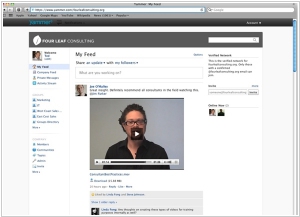
Leading social software vendors Yammer, Jive, NewsGator updated their products and showed us the latest trends, transforming the corporate social networks. Yammer has released the desktop AIR-client (Win and Mac), added the ability to post videos in microblog posts, reward colleagues with badges for completed tasks (we have already seen such gamification in Rypple and Producteev), and realized the integration with NetSuite, reminding the bunch Salesforce + Chatter. NewsGator in its new version of NewsGator Social Sites 2 focused on improving the Sharepoint video capabilities (recall, Newsgator Social Sites works on top of the Sharepoint). Like in Yammer, videos can now be easily inserted into microblog messages and besides they are added to the video gallery (something like YouTube for the Enterprise) where all the social capabilities can also be utilized - comments, rating, likes: ***
2011. Jive acquired document collaboration service OffiSync

Jive is the champion on the enterprise social software market, and regarding the social functions (creating social connections, customer engagement, integrating the intranet with Facebook and Twitter) - it's the best of breed solution. But document collaboration tools in Jive leave much to be desired. Therefore, Jive is often used as a social layer in combination with Sharepoint or other collaboration solutions. But of course, Jive wants to fill this gap. Today Jive has acquired OffiSync - the document collaboration service. Recall, OffiSync - is a plugin + service, which allows almost real time collaboration on MS Office documents using Google Docs as the synchronization point. Recently, Google has released almost similar (and free) service Google Cloud Connect that could take OffiSync out of the market, so Jive's acquisition - is a great outlet for the start-up. Especially taking into account the price tag - $25-30 million. ***

